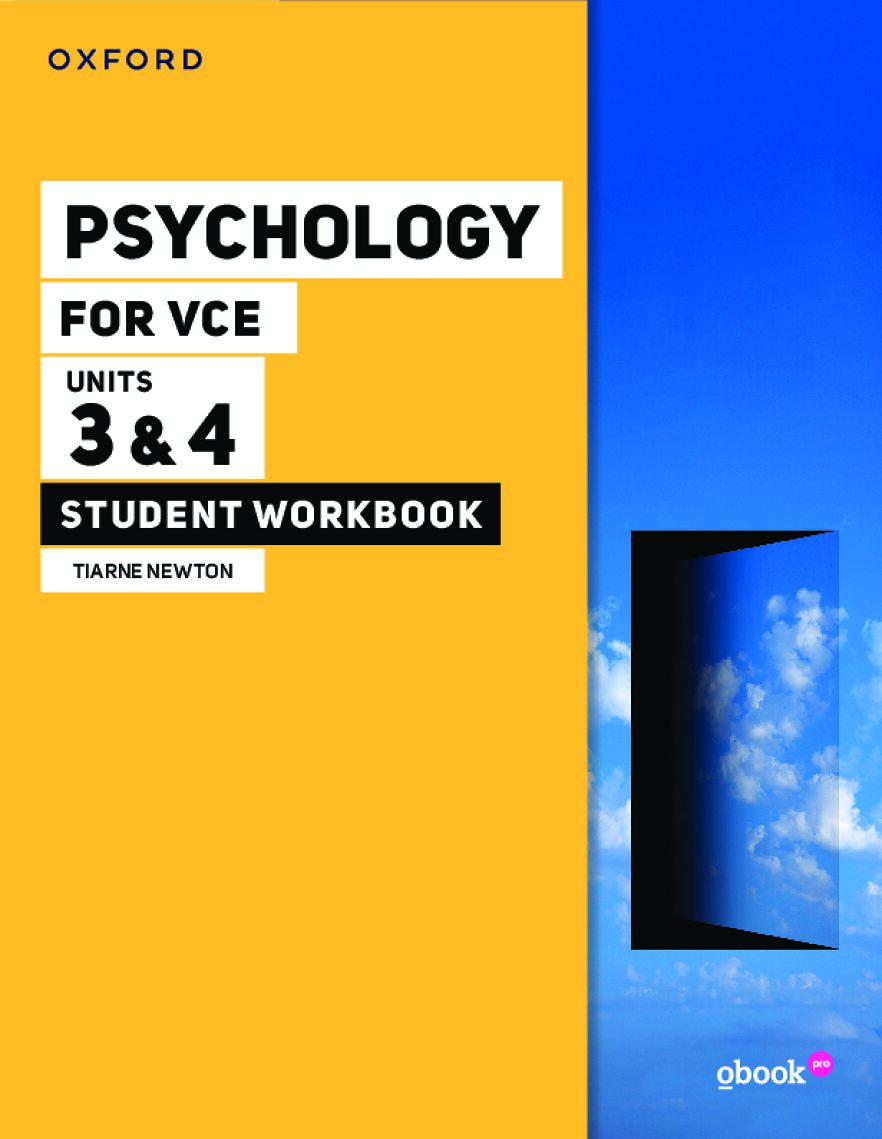Psychology for VCE Unit 3 & 4 Student Workbook+obook pro

Psychology for VCE Unit 3 & 4 Student Workbook+obook pro
|
ISBN: |
9780190338107 |
|
Binding: |
Paperback + obook |
|
Published: |
20 Jun 2024 |
|
Availability: |
523
|
|
Series: |
$29.95 AUD
$22.95 NZD
Add To CartDescription
Consolidate learning and master key science skills with the Student Workbook
Psychology for VCE Student Workbook is a dynamic resource with engaging design, full-colour photos, and relevant diagrams to support student success. Paired with Oxford Digital, it offers digital resources and assessment tools, merging print and digital learning seamlessly for comprehensive student support.
Including features such as write-in pages and literacy support tools, each chapter aligns with the Student Book to ensure a cohesive learning experience. Checklists and summaries are provided for easy reference, aiding students to organise their learning materials and consolidate key concepts.
In addition to science-focused questions and skill-building, the Student Workbook offers ethics evaluations, research review tasks, and cumulative practice exam questions for thorough assessment preparation.
*Digital Student access for 1 year from the date of activation.
FEATURES
- Write-in pages
- Word wizard to support student literacy
- Research review
- Chapters aligned to the student book to provide extra support for consolidating learning and developing skills
- Chapter checklists provide students with the opportunity to self-assess learning and offer personalised activities to address gaps in student understanding
- Content summary
- Groundwork questions by chapter (focus on science understanding)
- Activities focused on development of key science skills:
- Data drill
- Case cracker
- Investigation inspector
- Evaluating ethics
- Research review
- Cumulative practice exam questions by unit
Contents
Chapter 1 Psychology toolkit
1.1 Develop aims and questions, formulate hypotheses and make predictions
1.2 Plan and conduct investigations
1.3 Comply with safety and ethical guidelines
1.4 Generate, collate and record data
1.5 Analyse and evaluate data and investigation methods
1.6 Construct evidence-based arguments and draw conclusions
1.7 Analyse, evaluate and communicate scientific ideas
Unit 3 How does experience affect behaviour and mental processes?
Word wizard
Chapter 2 Nervous system functioning
Chapter checklist
Groundwork
Case cracker
Data drill
Investigation inspector
Evaluating ethics
Research review
Chapter 3 Stress as a psychobiological process
Chapter checklist
Groundwork
Case cracker
Data drill
Investigation inspector
Evaluating ethics
Research review
Chapter 4 Approaches to understanding learning
Chapter checklist
Groundwork
Case cracker
Data drill
Investigation inspector
Evaluating ethics
Research review
Chapter 5 The psychobiological process of memory
Chapter checklist
Groundwork
Case cracker
Data drill
Investigation inspector
Evaluating ethics
Research review
Unit 3 Practice exam questions
Unit 4 How is mental wellbeing supported and maintained?
Word wizard
Chapter 6 The demand for sleep
Chapter checklist
Groundwork
Case cracker
Data drill
Investigation inspector
Evaluating ethics
Research review
Chapter 7 The importance of sleep for mental wellbeing
Chapter checklist
Groundwork
Case cracker
Data drill
Investigation inspector
Evaluating ethics
Research review
Chapter 8 Defining mental wellbeing
Chapter checklist
Groundwork
Case cracker
Data drill
Investigation inspector
Research review
Evaluating ethics
Chapter 9 Specific phobia
Chapter checklist
Groundwork
Case cracker
Data drill
Investigation inspector
Evaluating ethics
Research review
Chapter 10 Maintenance of mental wellbeing
Chapter checklist
Groundwork
Case cracker
Data drill
Investigation inspector
Evaluating ethics
Research review
Chapter 11 Student designed investigation
11.1 Investigation design
11.2 Scientific evidence
11.3 Scientific communication
Unit 4 Practice exam questions
Units 3 & 4 Practice exam questions
Chapter 12 Investigations
2.1 Does activation of the sympathetic and parasympathetic nervous systems lead to a change in heart rate?
2.3 How can neural transmission across a synapse be modelled?
3.1 How can we teach primary school students about the flight-or-fight-or-freeze response?
3.4 Can diets rich in healthy bacteria and probiotics be used to treat stress-induced gastrointestinal damage?
4.1 How can we model the process of observational learning in practice?
4.2 How do different circumstances affect the time in which a conditioned response is learnt?
4.3 Can pigeons learn to operate military weapons?
5.4A Can the method of loci improve memorisation of visual information?
5.4B How does Aboriginal peoples’ use of Songlines improve memory?
6.2A Does the time taken to fall asleep affect the duration of the first sleep cycle?
6.2B What factors are affecting the sleep of adolescents?
7.3A How can the sleep of new shift workers be improved?
7.3B How can you improve sleep hygiene by modifying your diet?
8.2A Is there a correlation between stress and perceived mental wellbeing in the workplace?
8.2B How has the COVID-19 pandemic affected the mental wellbeing of students?
9.4A How does exposure to a phobic stimulus aid in the treatment of specific phobia?
9.4B How can identification of biopsychosocial factors be used to inform the treatment of a specific phobia?
10.1 Is there a relationship between daily water intake and perceived levels of mental wellbeing?
10.2 Does mindfulness meditation improve relaxation?
Authors
Tiarne Newton
Tiarne holds a Bachelor of Arts (Psychology & Literature) and Secondary Education. She has been contributing her expertise as a senior Psychology teacher at East Doncaster Secondary College for the past six years. Tiarne has played a pivotal role in enhancing the Science teaching and learning program, notably through the introduction of a novel Psychology curriculum tailored to Year 10 students. She has been actively engaged as a VCAA exam marker and has contributed to writing and reviewing student practice exam papers. Her continued commitment to enhancing student resources, alongside her passion for teaching Psychology to senior students, exemplifies her dedication to educational advancement and creativity.